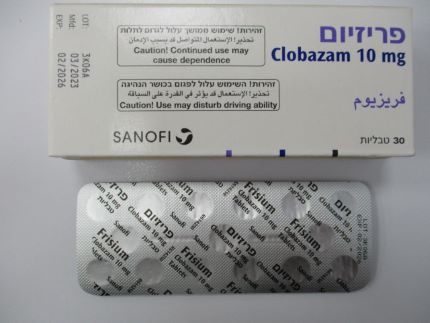Quest for the right Drug

פריזיום FRISIUM (CLOBAZAM)
תרופה במרשם
תרופה בסל
נרקוטיקה
ציטוטוקסיקה
צורת מתן:
פומי : PER OS
צורת מינון:
טבליה : TABLETS
עלון לרופא
מינוניםPosology התוויות
Indications תופעות לוואי
Adverse reactions התוויות נגד
Contraindications אינטראקציות
Interactions מינון יתר
Overdose הריון/הנקה
Pregnancy & Lactation אוכלוסיות מיוחדות
Special populations תכונות פרמקולוגיות
Pharmacological properties מידע רוקחי
Pharmaceutical particulars אזהרת שימוש
Special Warning עלון לרופא
Physicians Leaflet
Pharmacological properties : תכונות פרמקולוגיות
Pharmacodynamic Properties
5.1 Pharmacodynamic properties Clobazam is a 1,5-benzodiazepine. In single doses up to 20 mg or in divided doses up to 30 mg, clobazam does not affect psychomotor function, skilled performance, memory or higher mental functions.
Pharmacokinetic Properties
5.2 Pharmacokinetic properties A bsorption After oral administration, clobazam is rapidly and extensively absorbed. Time to peak plasma concentrations (Tmax) is achieved from 0.5 – 4.0 hrs. The administration of clobazam tablets with food or crushed in applesauce slows the rate of absorption by approximately 1 hour, but it does not affect the overall extent of absorption. Clobazam can be given without regard to meals. Concomitant intake of alcohol can increase the bioavailability of clobazam by 50%. Distribution After a single dose of 20 mg clobazam, marked interindividual variability in maximum plasma concentrations (222 – 709 ng/ml) was observed after 0.25 – 4 hours. Clobazam is lipophilic and 11 distributes rapidly throughout the body. Based on a population pharmacokinetic analysis, the apparent volume of distribution at steady-state was approximately 102 L, and is concentration independent over the therapeutic range. Approximately 80 – 90% of clobazam is bound to plasma protein. Clobazam accumulates approximately 2 – 3-fold to steady-state while the active metabolite N- desmethylclobazam (N- CLB) accumulates approximately 20-fold following clobazam twice daily administration. Steady state concentrations are reached within approximately 2 weeks. Metabolism Clobazam is rapidly and extensively metabolized in the liver. Clobazam metabolism occurs primarily by hepatic demethylation to N-desmethylclobazam (N-CLB), mediated by CYP3A4 and to a lesser extent by CYP2C19. N-CLB is an active metabolite and the main circulating metabolite found in human plasma. N-CLB undergoes further biotransformation in the liver to form 4-hydroxy-N-desmethylclobazam, primarily mediated by CYP2C19. CYP2C19 poor metabolizers exhibit a 5-fold higher plasma concentration of N-CLB compared to extensive metabolizers. Clobazam is a weak CYP2D6 inhibitor. Co-administration with dextromethorphan led to increases of 90% in AUC and 59% in Cmax values for dextromethorphan. Concomitant administration of 400 mg ketoconazole (CYP3A4 inhibitor) increased Clobazam AUC by 54% with no effect on Cmax. These changes are not considered clinically relevant. Elimination Based on a population pharmacokinetic analysis, plasma elimination half-lives of clobazam and N- CLB were estimated to be 36 hours and 79 hours respectively. Clobazam is cleared mainly by hepatic metabolism with subsequent renal elimination. In a mass balance study, approximately 80% of the administered dose was recovered in urine and about 11% in the faeces. Less than 1% of unchanged clobazam and less than 10% of unchanged N- CLB are excreted through the kidneys.

שימוש לפי פנקס קופ''ח כללית 1994
לא צוין
תאריך הכללה מקורי בסל
לא צוין
הגבלות
לא צוין
מידע נוסף
